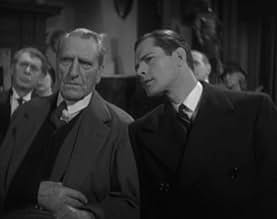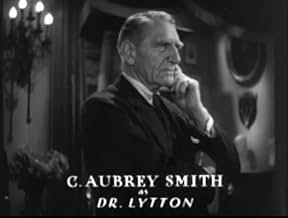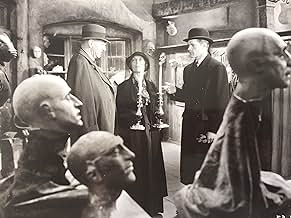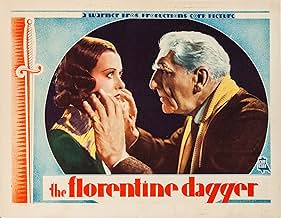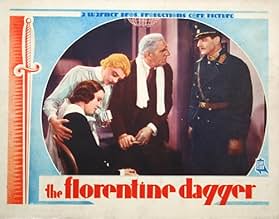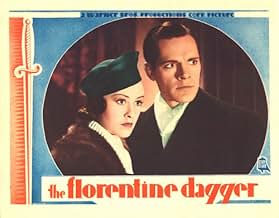Juan Cesare, a descendant of the Borgias of Vienna, thinks he may have a murder streak in him acquired from his long-dead relatives, is is love with Florence Ballau, but her father lodges a ... Read allJuan Cesare, a descendant of the Borgias of Vienna, thinks he may have a murder streak in him acquired from his long-dead relatives, is is love with Florence Ballau, but her father lodges a strong protest. Victor Ballau is later found dead with a Florentine dagger of the Borgia t... Read allJuan Cesare, a descendant of the Borgias of Vienna, thinks he may have a murder streak in him acquired from his long-dead relatives, is is love with Florence Ballau, but her father lodges a strong protest. Victor Ballau is later found dead with a Florentine dagger of the Borgia type stuck firmly in him. Juan is all wrought up and tortured by thoughts he may have been ... Read all
- Director
- Writers
- Stars
- Bartender
- (scenes deleted)
- Newspaper Editor
- (scenes deleted)
- Eric - Night Watchman
- (uncredited)
- Detective
- (uncredited)
- Director
- Writers
- All cast & crew
- Production, box office & more at IMDbPro
Featured reviews
When O'Neill becomes the victim of a stabbing, the plot thickens as Detective Von Brinkner (ROBERT BARRAT) goes about trying to solve the crime. But it's really C. AUBREY SMITH who does most of the snooping to uncover the reason behind O'Neill's vicious death.
However, it's Barrat's lively performance as the playboy detective that gives a lift to the story and a bit of humor that's badly needed.
It's really a B-film struggling to look like an A-film with some proper atmosphere and period settings, but the story is told in dull fashion and never quite becomes as fascinating as the film's imaginative title.
"If there's one thing more useless than a talkative woman it is one that is determined not to talk."
Based on a novel by Ben Hecht, THE FLORENTINE DAGGER is raised above the level of modest murder programmers on the strength of its unusual plot, moody atmospherics and very fine acting. Sir C. Aubrey Smith graces the proceedings as a kindly old doctor who helps a young playwright and a spirited actress (Donald Woods & Margaret Lindsay) find happiness together, despite homicide and a possible family curse. Robert Barrat is also much fun as an eccentric, flirtatious police inspector; surprisingly, he becomes the story's true hero in the movie's closing moments.
The supporting cast includes Henry O'Neill as a Viennese theatrical producer; Florence Fair as his troubled housekeeper; Frank Reicher as a harried stage manager; Rafaela Ottiano & Charles Judels as worried Italian innkeepers; Paul Porcasi as a timid policeman; Eily Malyon as a lady who knows more about the murder than she's willing to say; and wonderful Herman Bing as a flustered Austrian baker.
The conclusion comes as a bit of a surprise, considering the Production Code's requirement for the punishment of all movie murderers...
*************************
Much is said, in the film's first half, about Cesare Borgia. It might prove interesting to review the facts of his life. The illegitimate son of Pope Alexander VI, Cesare (1475-1507) started his rise to power early, first in his ancestral Spain and later in Italy. At the age of seven he was created prothonotary & canon of the cathedral of Valencia - but it was in 1491 at the age of sixteen that his career really started to move. Over the course of the next two years Cesare was quickly created bishop, archbishop & cardinal. In 1498 he renounced his cardinalate to become Captain General of the Papal Army. Working hand in glove with the Pope, his father, they furthered their schemes towards wresting a northern Italian kingdom for Cesare.
A marriage that same year with the sister of the King of Navarre and the acceptance of a French dukedom, gave Cesare & Alexander the French support they would need for their plots of conquest. By 1500 Cesare was fully immersed in his generally successful campaigns. (One of his victims was Duke Alfonso of Bisceglie, the husband of Cesare's wicked sister Lucrezia; that unlucky gentleman had been stabbed by a quartet of Cesare's assassins and subsequently strangled in his sickbed by Cesare's servant.) Hated & despised by the rank and file of the citizenry of Italy, Alexander & Cesare had to constantly fight against the overwhelming tide of public opinion.
Surviving one rebellion in his army - and treacherously murdering the ringleaders after feigning peace - Cesare's fortunes at last crumbled with the death of his father in 1503. The new pope, Julius II, was an implacable enemy and demanded the release of Cesare's dominions. Cesare was eventually captured by the Spanish, imprisoned in Spain, and made a daring escape. He now offered his services to his brother-in-law, the King of Navarre. Cesare Borgia's short, violent, utterly fascinating life came to an end in 1507 when he was killed in a skirmish with rebels.
** (out of 4)
Yet another murder/mystery with this time a young play-write (Donald Woods) stopping off in a small village where he meets a beautiful young woman (Margaret Lindsay) who he wants in his latest play. Soon the play is a hit and they want to be married but her father (Henry O'Neill) refuses permission but soon he's found dead with a dagger in his heart. That's pretty much the set-up to this thing but in the end I found the majority of the picture to be downright boring with very little going for it. I've always thought Florey did his best work outside this genre as it just seemed like he never could pull things together very well. I think the biggest problem with this film isn't his direction but instead it's the screenplay that doesn't offer up any decent characters and the weak story is just a major drag. I had a very hard time getting into the film early on simply because the characters were all underwritten and even worse is the fact that the movie itself doesn't really know what it wants to do. Yes, we eventually get the mystery but everything is pretty dry without any small laughs and the romance is pretty boring as well. Woods is usually a very reliable actor but even he seems very bored here as he goes from one scene to another without too much energy and seems to be lacking any type of passion. Lindsay is also pretty bland in his role but so is O'Neill as the soon-to-be-dead father and Robert Barrat does very little with the Inspector role. C. Aubrey Smith is good as the doctor who ends up staying close to Woods. Florey does add a couple nice touches including a rich atmosphere in the house as well as a few other scenes where the darkness does some justice but in the end this thing is just too flat for its own good.
The story starts with three visitors to the famous abandoned castle of the Borgias in Italy. One is producer Victor Ballau (Henry O'Neill), another is psychiatrist Gerard Lytton (C. Aubrey Smith), and a third is a troubled young man (Donald Woods) who is the last of the Borgias - his namesake is Cesare Borgia to whom he bears a remarkable likeness. The troubled young man, Juan Cesare, attempts suicide to prevent himself from becoming a murderer when he feels the Borgia urge to kill rise up in him. Fortunately his attempt is thwarted by Dr. Lytton. Instead, Juan goes to Vienna where he recovers from his obsessions with his heritage and writes a play for Ballau that is about the Borgias. Juan cannot find the perfect Lucrezia Borgia for his play until he meets Ballau's step-daughter Florence (Margaret Lindsay). The long and short of it is that Victor Ballau winds up dead in his study one night, stabbed to death with one of the Florentine daggers he possesses that once belonged to the Borgias. There are many suspects, and the mystery has many unexpected twists and turns and for that matter, many improbabilities.
One of the goofiest and best things about this film besides its campy dialogue is Robert Barrat's performance as Police Inspector Von Brinkner who is in charge of the murder investigation. Von Brinkner's not a threatening kind of fellow at all, and he's given to all kinds of appetite, usually found to be chewing on brie and the finest food he can scrounge when he isn't chewing scenery, or talking to his girlfriend on the phone. However he turns out to be surprisingly competent and generous. Watch and find out what I mean.
One thing you'll probably note is the precode ending a full year after the production code went into effect. Again, you'll have to watch to find out what I mean, but I just don't know how the censors let this ending stand as it did.
Did you know
- TriviaWarner Bros. created the advertising marketing ploy "Clue Club" to increase audiences attending its crime mystery/drama movies. Twelve titles showing the Warner Bros. "Clue Club" promo footage were released from 1935 to 1938.
Clue Club #1: The White Cockatoo (1935)
Clue Club #2: While the Patient Slept (1935)
Clue Club #3: The Florentine Dagger (1935)
Clue Club #4: The Case of the Curious Bride (1935)
Clue Club #5: The Case of the Lucky Legs (1935)
Clue Club #6: The Murder of Dr. Harrigan (1936)
Clue Club #7: Murder by an Aristocrat (1936)
Clue Club #8: The Case of the Velvet Claws (1936)
Clue Club #9: The Case of the Black Cat (1936)
Clue Club #10: The Case of the Stuttering Bishop (1937)
Clue Club #11: The Patient in Room 18 (1938)
Clue Club #12: Mystery House (1938)
Details
- Release date
- Country of origin
- Languages
- Also known as
- Clue Club #3: The Florentine Dagger
- Filming locations
- Production company
- See more company credits at IMDbPro
- Runtime
- 1h 9m(69 min)
- Color
- Sound mix
- Aspect ratio
- 1.37 : 1

